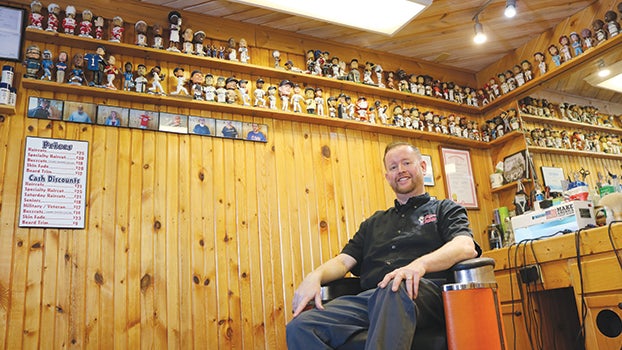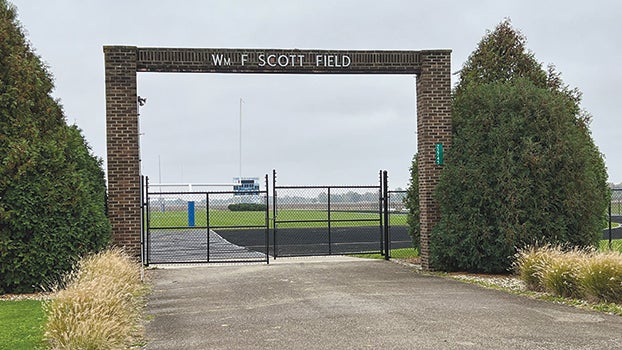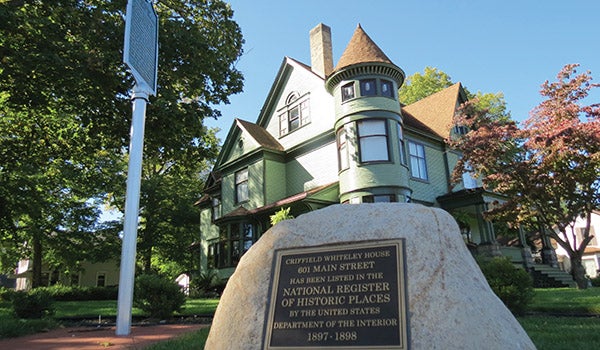Buchanan man shares passion for history through live presentations
Published 12:11 pm Thursday, February 23, 2017
When Eric Hageman was a child there rarely was a dull dinner at this family’s house.
As a history professor, Hageman’s father had a penchant for making history come alive. Over the course of the meal, he could illustrate an entire battle or make a complex historical fact interesting.
Those dinners inspired Hageman, and since early childhood he has read just about every piece of historical literature he could get his hands on.
It was not until he was an adult that a friend coaxed him into trying re-enactment. Today, he helps other people engage with history in a way that, much like his dad’s story telling, makes people feel that they are there.
How did you get involved in character playing?
Fast forward to 1982, I went to church with Bruce Sanderson who was a Civil War re-enactor and we would start talking. He knew a lot about the Civil War and so we were kindred spirits. One day he said, “Do you want to go to a Civil War re-enactment?” I had no interest in participating. I told my wife, “Bruce keeps pestering me.”
To me [it seemed] like a bunch of little boys playing Army. I do not want to glorify war. I think war is a terrible thing, but he stayed on me for 10 years.
So I told her, “You know what? I think I am going to try this just to appease him. I will do it and it will shut him up.”
So he loaned me a bunch of gear and we went to the re-enactment that they had in Jackson, Michigan, and it was for the weekend and when I left I had all of my own gear.
I got an element I had never thought of. When you take a subject like history, something that you really love to read about and you understand the political implications and why they did this and the results and all that, but then you take a new element and you start experiencing what some of the people that were involved in all of that.
Do you have a favorite memory from your time spent as a war
re-enactor?
I have friends all over the U.S. We have a real bond of a friendship. I think instead of memories the re-enacting opened a lot of doors for me to experience things that I never would have experienced.
For example, I got involved in the film industry. In 1997, I heard that they were going to do a documentary drama, interestingly enough on the battle of Antitem, which is where my roots go back for the national Battlefield Visitors Center, so I just kind of tossed out a couple of photographs of myself. I looked a lot younger then.
How long are you guys out there?
Usually re-enactments are three-day re-enactments.
Where do you do re-enactments?
They are all over. We have local, and when I say local, something in Michigan or statewide, and we have national and those are big events. For example the battle of Gettysburg. I mean the 135th, the 140th anniversary. They have huge re-enactments.
The one 135th, I believe there are 5,000 re-enactors there, which is an awesome thing. I try to make two to three re-enactments a year and maybe go to one or two locals and one national.
I want to keep my hobbies in balance with my personal life. You can go to a re-enactment every weekend. I know of guys who get into the hobby and then their marriages fall apart and they are not there for their kids and then they burn out and it is a lot of work.
There is a lot of prep work. Then coming home you have all the cleanup. Where I have been able to sustain my hobby for many years, because I keep it in balance.
What do you feel that people gain from watching a war re-enactment?
They would gain a very…I want to word this correctly.
You could never fully re-enact the Civil War. They suffered massive wounds. They probably gain some idea if they are watching the battles themselves. They probably gained some idea of how troops are manipulated.
It was not like today where guys are diving behind trees. They actually had battle formations in two ranks and it was like a chess game, where they were trying to out maneuver the…if they were Federals they wanted to our maneuver the Confederates to get in the right position to be able to form what they called a mass fire. That is why they have tight ranks. You literally have a guy on your right arm and a guy on your left arm, all the way down the length can go on for a mile in two ranks, because when they volleyed they wanted a wall of lead going, so they did not want guys spread out and everything.
Well when you have a line like that you have to be able to maneuver that line. So you see all this maneuvering in the field, because one of the great advantages is if one line gets on the flank of another line then they can pour fire down into it from the side.
It is awesome to see one group maneuver and see 1,000 guys in like five seconds turn the entire line to be able to face it. And there are all sorts of movements, where it takes a long time to learn it.
There is a lot of training involved and drilling and understand the Napoleonic tactics, but it is awesome to watch. But my dad went to a Civil War re-enactment once and he watched the battle and he said, ‘that was real interesting, but with all that firing that was going on, the casualties rates were minimal.” Because guys like to fight and they do not want to drop.







